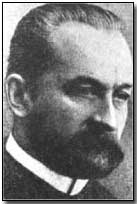Primary Documents - Manifesto of Russian Council of Workmen and Soldiers, 15 May 1917
 Reproduced below is the
text of a manifesto issued by the influential Russian Council of Workmen and
Soldiers dated 15 May 1917.
Reproduced below is the
text of a manifesto issued by the influential Russian Council of Workmen and
Soldiers dated 15 May 1917.
In the manifesto the Council attempted to shore up increasingly shaky support for the newly installed Provisional Government (following Tsar Nicholas II's abdication in the wake of the February Revolution), specifically among soldiers on the front lines.
Decrying reports of "fraternisation" between Russian and German/Austro-Hungarian forces, the Council advised soldiers to "reject, therefore, everything which weakens your military power", stating that the revolution depended upon Russian military success.
Click here to read an address by War Justice Alexander Guchkov dated 10 May 1917 and here for another by Minister of Justice Alexander Kerenski four days later pleading the same cause.
Click here to read a follow-up statement by the Council of Workmen and Soldiers dated 23 July 1917; and another dated 25 July 1917.
Manifesto of 15 May 1917 by Council of Workmen and Soldiers
Soldiers and comrades at the front, we speak to you in the name of the Russian revolutionary democracy.
The people did not wish the war, which was begun by the Emperors and capitalists of all countries, and, therefore, after the abdication of the Czar, the people considered it urgent to end the war as rapidly as possible.
Do not forget, soldiers and comrades, that the regiments of William are destroying revolutionary Russia. Do not forget that the loss of free Russia would be a catastrophe, not only to us but to the working classes of the entire world. Defend, therefore, revolutionary Russia with all your power.
The Council of Workmen's and Soldiers' Delegates leads you toward peace in another way. By calling for a revolution of the workmen and peasants of Germany and Austria-Hungary we will lead you to peace after having obtained from our Government a renunciation of the policy of conquest and after demanding a similar renunciation from the allied powers.
But do not forget, soldiers and comrades, that peace cannot be achieved if you do not check the enemy's pressure at the front, if your ranks are pierced and the Russian revolution lies like an inanimate body at William's feet. Do not forget, you in the trenches, that you are defending the liberty of the Russian revolution and your brother workmen and peasants.
Now, how are you to accomplish this defence if you remain inactive in your trenches? Frequently only an offensive can repel or check a hostile offensive, frequently those who await an attack perish.
Soldiers and comrades, having sworn to defend Russian liberty, do not renounce the offensive. Fight and struggle for this liberty, and while fighting and struggling fear the enemy's traps. The fraternizing which is taking place at present at the front can easily become a trap. Do not forget that revolutionary troops have only the right to fraternize with troops who are also revolutionary and who are also ready to die for peace and liberty.
The German Army is not a revolutionary army if it is still blindly following William and Charles, Emperors and capitalists. You are fraternizing openly, not with enemy soldiers but with officers of the enemy's General Staff, disguised as common soldiers. Peace will not be obtained by separate treaties or by the fraternizing of isolated regiments and battalions. This will only lead to the loss of the Russian revolution, the safety of which does not lie in a separate peace or armistice.
Reject, therefore, everything which weakens your military power, which distracts the army and lowers its morale. Soldiers, be worthy of the trust that revolutionary Russia puts in you.
Source: Source Records of the Great War, Vol. V, ed. Charles F. Horne, National Alumni 1923
Shrapnel comprised steel balls ejected from shells upon detonation.
- Did you know?
